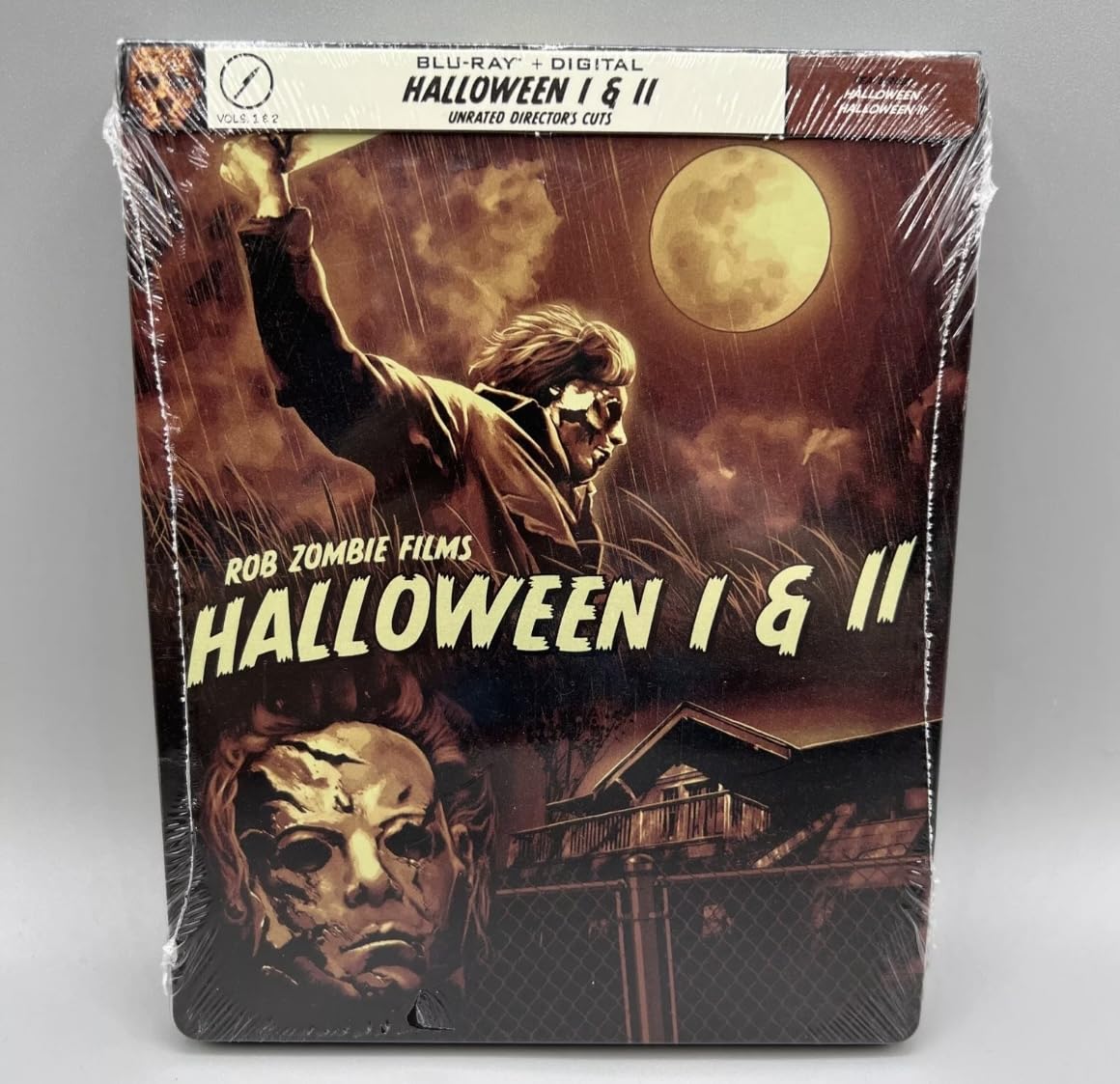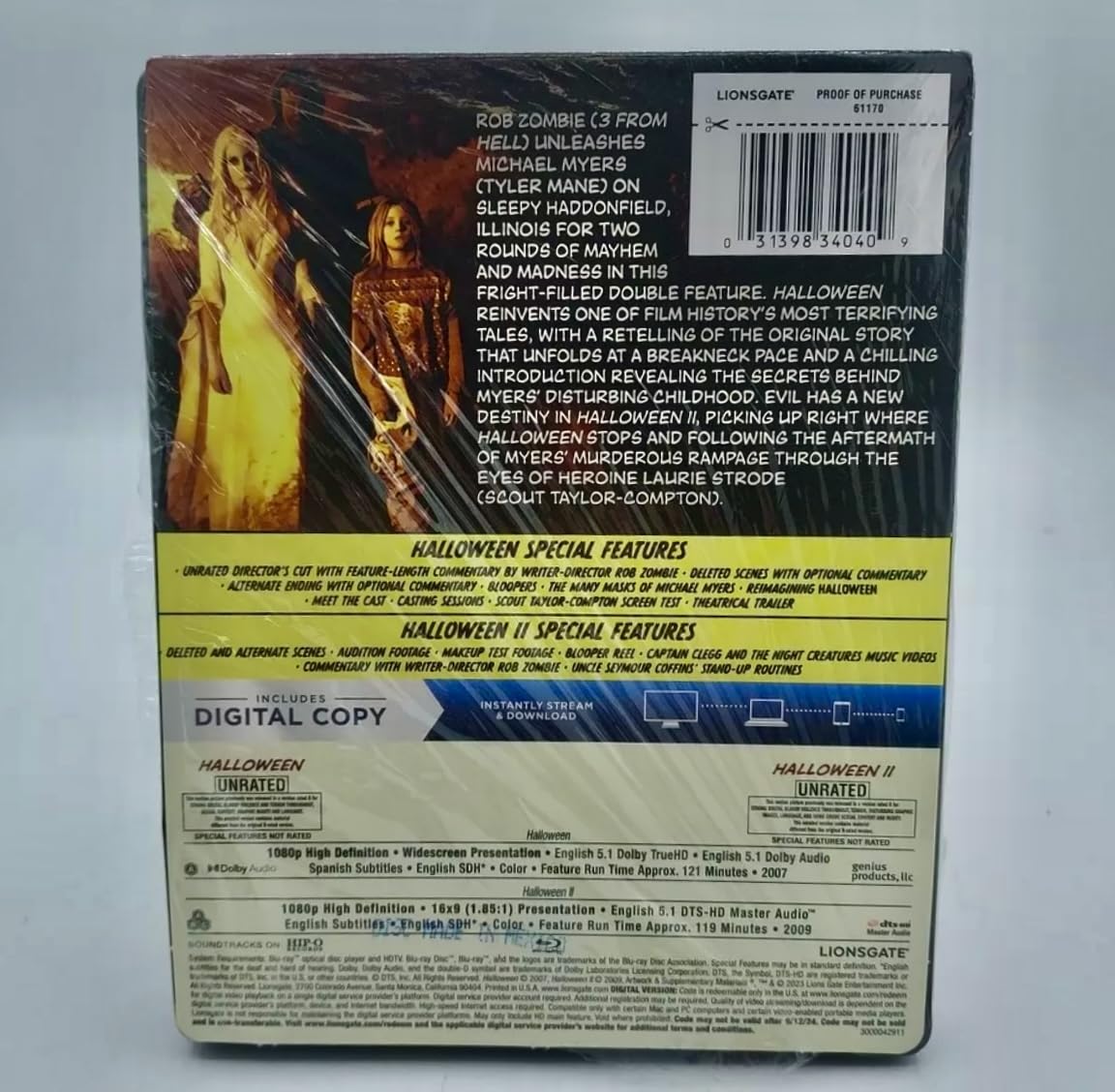
Wm Rob Zombie Halloween 1&2 Review Rob Zombie Halloween – Oemiu
Wm Rob Zombie Halloween 1&2 Review
Rob Zombie’s take on the Halloween franchise is nothing if not divisive. Stepping into the shoes of John Carpenter, a legend in the horror genre, was never going to be easy, and Zombie’s 2007 remake and its 2009 sequel are a testament to the challenges – and some of the triumphs – of reinterpreting a classic. While some celebrate his gritty, visceral approach and exploration of Michael Myers’ troubled childhood, others decry it as a departure from the subtle, atmospheric horror that made the original so iconic. Evaluating these films requires understanding Zombie’s unique cinematic vision and how it both honors and diverges from the source material. This is more than just a simple remake; it’s a complete reimagining of the origin and motivations behind one of cinema’s most enduring boogeymen. We’ll delve into the specifics of each film, analyzing their strengths and weaknesses, and ultimately considering their place within the broader Halloween legacy.
Rob Zombie’s Halloween (2007): A Brutal Reimagining
The 2007 *Wm Rob Zombie Halloween* served as a comprehensive origin story for Michael Myers, something the original film only hinted at. Instead of immediately presenting us with a masked killer, Zombie spends a significant portion of the film exploring Michael’s troubled childhood in a dysfunctional family. We see him as a young boy, dealing with bullying, abuse, and a nascent psychopathic tendency. This exploration, while controversial, aims to provide a psychological basis for Michael’s later actions. It humanizes him, albeit in a deeply disturbing way, offering a potential explanation for his descent into madness. This is a stark contrast to Carpenter’s original, where Michael is often seen as an almost supernatural force of pure evil. This difference in approach is fundamental to understanding the core of Zombie’s vision. The film’s first half is largely dedicated to these formative years, culminating in Michael’s institutionalization at Smith’s Grove Sanitarium under the care of Dr. Samuel Loomis. This first act is undeniably heavy, filled with violence and unsettling imagery designed to shock and disturb the viewer. It aims to create a sense of unease and foreshadow the horrors to come.
The latter half of the film mirrors the events of the original Halloween, albeit with Zombie’s signature stylistic flourishes. Michael escapes from Smith’s Grove and returns to Haddonfield, where he begins his rampage. While the basic plot points remain the same, the execution is significantly different. The violence is more graphic, the atmosphere more oppressive, and the characters more overtly flawed. Laurie Strode, played by Scout Taylor-Compton, is portrayed as a more vulnerable and realistic teenager, rather than the resourceful and almost preternaturally aware character Jamie Lee Curtis embodied. This shift in characterization is a recurring theme in Zombie’s films, often opting for a more grounded and gritty portrayal of individuals caught in extreme circumstances. The film’s ending, while adhering to the broad strokes of Carpenter’s conclusion, feels distinctly different. The sense of ambiguity and lingering dread present in the original is replaced with a more definitive, and arguably less satisfying, resolution. While Rob Zombie’s Halloween does not shy away from the shock value, its true strength lies in the complex character study of a broken child turned into a monstrous killer.
The Good, The Bad, and The Bloody: Analyzing the 2007 Remake
Several aspects of Rob Zombie’s Halloween remake are undeniably effective. The exploration of Michael Myers’ childhood, while controversial, provides a unique perspective on the character and his motivations. The casting, particularly Daeg Faerch as the young Michael, is strong, capturing the unsettling innocence and latent menace of the character. The film’s visual style, characterized by its gritty realism and intense violence, is undeniably impactful, even if it can be overwhelming at times. The soundtrack, a mix of classic rock and original compositions, effectively creates a sense of unease and dread. The film also benefits from strong performances from Malcolm McDowell as Dr. Loomis, who brings a sense of weary resignation to the role. McDowell’s Loomis is less the heroic figure of the original and more a world-weary psychiatrist struggling to understand the darkness he is dealing with. He is a man haunted by his past failures and increasingly skeptical of his own abilities.
However, the film also suffers from several weaknesses. The excessive violence and profanity, while characteristic of Zombie’s style, can feel gratuitous and detract from the overall impact of the story. The dialogue is often clunky and unnatural, lacking the subtle wit and understated tension of Carpenter’s original. Some critics argue that the film’s attempt to humanize Michael Myers ultimately undermines his effectiveness as a boogeyman, stripping him of the mystique and ambiguity that made him so terrifying. Furthermore, the film’s reliance on shock value can overshadow the underlying themes of trauma, abuse, and mental illness. The very nature of the *Rob Zombie Halloween* approach, while unique, inadvertently diminishes the impact of the later, more traditionally slasher-style sequences. The sheer intensity of the first half can leave the audience desensitized to the violence that follows, reducing its overall impact.
| Aspect | Rob Zombie’s Halloween (2007) | John Carpenter’s Halloween (1978) |
|---|---|---|
| Origin Story | Extensive exploration of Michael’s childhood | Minimal backstory, focusing on the immediate threat |
| Violence | Graphic and explicit | Implied and suspenseful |
| Michael Myers’ Motivation | Implied psychological factors and trauma | Seemingly random act of pure evil |
| Dr. Loomis | World-weary psychiatrist | Determined and almost prophetic figure |
| Laurie Strode | Vulnerable and realistic teenager | Resourceful and almost preternaturally aware |
Rob Zombie’s Halloween II (2009): A Descent into Madness
Rob Zombie’s Halloween II picks up immediately after the events of the first film, departing even further from the established Halloween canon. Laurie Strode is traumatized and struggling to cope with the events of the previous year. Michael Myers, presumed dead, is very much alive and on the hunt once again. This sequel delves even deeper into the psychological impact of trauma, both on Laurie and Michael. Laurie is plagued by nightmares and hallucinations, struggling to reconcile her own identity with the horrific events she has experienced. This film explores themes of PTSD, survivor’s guilt, and the psychological toll of violence.
Michael’s motivations become even more ambiguous in this sequel. He is driven by visions of his deceased mother, Deborah Myers, who urges him to find Laurie. This supernatural element is a significant departure from the more grounded realism of the first film, and it further divides audiences. Some find it to be a fascinating exploration of Michael’s fractured psyche, while others view it as a nonsensical addition that undermines the character’s established mythology. This film arguably abandons the conventions of the slasher genre entirely, opting for a more surreal and psychological horror experience. The violence is even more intense and disturbing than in the first film, and the atmosphere is relentlessly bleak and oppressive. The film culminates in a brutal and ambiguous climax that leaves the audience questioning the very nature of reality.
Strengths and Weaknesses of Halloween II: A Divisive Sequel
One of the main strengths of Halloween II is its unflinching portrayal of trauma and its psychological effects. Scout Taylor-Compton delivers a powerful performance as Laurie Strode, capturing the character’s vulnerability and emotional turmoil. The film’s visual style is even more striking than in the first film, characterized by its dreamlike sequences, jarring editing, and use of color. The soundtrack, once again a mix of classic rock and original compositions, effectively creates a sense of unease and disorientation. The film also benefits from strong performances from Tyler Mane as Michael Myers, who brings a raw physicality and animalistic intensity to the role. The exploration of Michael’s inner world, through his visions of his mother, is undeniably intriguing, even if it is controversial.
However, Halloween II suffers from many of the same weaknesses as its predecessor, amplified by the film’s more experimental nature. The excessive violence and profanity can feel even more gratuitous and detract from the overall impact of the story. The plot is often convoluted and difficult to follow, lacking the clarity and focus of the first film. Some critics argue that the film’s attempt to delve into Michael Myers’ psyche ultimately fails, reducing him to a caricature of his former self. The addition of supernatural elements, such as the visions of Deborah Myers, is divisive, with many viewers finding them to be nonsensical and unnecessary. Furthermore, the film’s ambiguous ending leaves many unanswered questions and provides little sense of closure. It is fair to say that Rob Zombie’s Halloween II is a film that demands attention, provoking strong opinions and offering a unique, if disturbing, interpretation of the Halloween mythos. The *Rob Zombie Halloween* sequel also raises questions about the long-term impact of violence on both victims and perpetrators.
| Aspect | Rob Zombie’s Halloween II (2009) | Rob Zombie’s Halloween (2007) |
|---|---|---|
| Plot | Laurie’s struggle with trauma, Michael’s visions | Michael’s origin and escape, mirroring the original |
| Violence | Extremely graphic and disturbing | Graphic and explicit |
| Michael Myers’ Motivation | Visions of his deceased mother | Implied psychological factors and trauma |
| Atmosphere | Surreal, bleak, and oppressive | Gritty and realistic |
| Laurie Strode | Severely traumatized and hallucinating | Vulnerable and emotionally damaged |
Legacy and Impact: The Enduring Debate Surrounding Rob Zombie’s Halloween
The *Rob Zombie Halloween* films continue to be a subject of intense debate among horror fans. Some celebrate them as bold and original reinterpretations of a classic franchise, while others decry them as disrespectful and unnecessary remakes. Regardless of one’s personal opinion, it is undeniable that these films have had a significant impact on the horror genre. They have sparked countless discussions about the nature of violence, the psychology of evil, and the role of remakes in cinema. The films have also influenced other horror filmmakers, inspiring them to take risks and push boundaries. The debate itself highlights the power and enduring appeal of the Halloween franchise. The very fact that Zombie’s films continue to be discussed and dissected years after their release is a testament to their impact.
Ultimately, the success or failure of Rob Zombie’s Halloween films is a matter of personal taste. There is no objective answer to whether they are “good” or “bad.” However, they are undeniably unique and thought-provoking. They offer a distinct perspective on the Halloween mythos, exploring themes of trauma, abuse, and mental illness in a way that the original films did not. They are not for the faint of heart, and they are certainly not for those who are easily offended. But for those who are willing to engage with their challenging and often disturbing content, they offer a fascinating and unforgettable cinematic experience. The success of Rob Zombie’s Halloween films also opened doors for other directors to reimagine classic horror properties in their own unique styles. This has led to a wave of remakes and reboots in recent years, some successful and some less so. The key takeaway is that Rob Zombie’s films challenged the status quo and forced audiences to reconsider their expectations of the Halloween franchise and the horror genre as a whole.
FAQ
What makes Rob Zombie’s Halloween films so controversial?
The controversy surrounding Rob Zombie’s Halloween films stems from several key factors. Firstly, they represent a significant departure from the tone and style of John Carpenter’s original Halloween. Carpenter’s film is known for its suspenseful atmosphere, minimalist score, and implied violence. Zombie’s films, on the other hand, are characterized by their graphic violence, profanity, and explicit sexuality. This stylistic difference alienated many fans of the original, who felt that Zombie’s approach was disrespectful and unnecessary. Secondly, Zombie’s films delve into Michael Myers’ childhood in great detail, attempting to provide a psychological explanation for his actions. This attempt to humanize Michael Myers was seen by some as undermining his effectiveness as a boogeyman, stripping him of the mystique and ambiguity that made him so terrifying. Finally, Zombie’s films are simply more extreme than the original Halloween films. They are more violent, more disturbing, and more challenging to watch. This extreme nature has divided audiences, with some praising them for their originality and others condemning them for their gratuitousness.
How do Rob Zombie’s Halloween films differ from John Carpenter’s original?
The differences between Rob Zombie’s Halloween films and John Carpenter’s original are substantial and multifaceted. The most significant divergence lies in the portrayal of Michael Myers. In Carpenter’s film, Michael is largely presented as an enigmatic force of nature, driven by an unknowable evil. Zombie’s films, conversely, dedicate a considerable portion of their runtime to exploring Michael’s troubled upbringing and psychological state. This attempt to provide a backstory and motivation for Michael’s actions fundamentally alters the character’s nature. Another key difference is the level of violence. Carpenter’s Halloween relies heavily on suspense and suggestion, implying violence rather than explicitly showing it. Zombie’s films, however, are far more graphic and visceral, showcasing brutal acts of violence in explicit detail. Furthermore, the characters in Zombie’s films are often portrayed as more flawed and morally ambiguous than those in Carpenter’s film. Laurie Strode, for example, is depicted as a vulnerable and traumatized teenager, rather than the resourceful and resilient survivor of the original.
Are Rob Zombie’s Halloween films considered good remakes?
Whether Rob Zombie’s Halloween films are considered “good” remakes is entirely subjective and depends heavily on individual preferences. Some viewers appreciate Zombie’s bold and uncompromising vision, arguing that he has created a unique and thought-provoking interpretation of the Halloween mythos. They may praise the films for their exploration of trauma, abuse, and mental illness, as well as their gritty realism and intense atmosphere. Others, however, view Zombie’s films as failures, arguing that they are disrespectful to the original, gratuitously violent, and poorly written. They may criticize the films for their attempt to humanize Michael Myers, their reliance on shock value, and their lack of suspense. Ultimately, there is no objective answer to this question. Whether or not you enjoy Rob Zombie’s Halloween films will depend on your own personal taste and your expectations for a remake.
What are the main criticisms of Rob Zombie’s Halloween II?
Rob Zombie’s Halloween II faced even harsher criticism than its predecessor, with many viewers finding it to be even more flawed and problematic. One of the main criticisms is the film’s convoluted and often nonsensical plot. The addition of supernatural elements, such as the visions of Deborah Myers, was widely criticized as being unnecessary and detracting from the film’s overall coherence. Another common complaint is the film’s excessive violence and profanity, which many viewers found to be gratuitous and exploitative. The film’s portrayal of Laurie Strode as a severely traumatized and hallucinating individual was also criticized, with some arguing that it undermined the character’s strength and resilience. Furthermore, the film’s ambiguous and depressing ending left many viewers feeling unsatisfied and frustrated. Overall, Halloween II is often seen as a descent into madness, both for the characters and for the film itself.
Did Rob Zombie have complete creative control over his Halloween films?
While Rob Zombie was given a significant degree of creative control over his Halloween films, it’s not entirely accurate to say he had complete autonomy. Studio interference and budget limitations inevitably played a role in shaping the final product. Zombie himself has spoken about certain compromises he had to make, particularly regarding the casting of certain roles and the pacing of certain scenes. However, he was largely allowed to pursue his own vision for the films, which is evident in their distinct style and tone. Unlike some remakes that attempt to simply recreate the original, Zombie’s Halloween films are clearly the product of his own unique sensibilities and artistic vision. However, the *Rob Zombie Halloween* journey certainly came with studio negotiations and challenges.
How did audiences and critics react to Rob Zombie’s Halloween films upon their release?
The initial reaction to Rob Zombie’s Halloween films was decidedly mixed. Critics were generally more negative, pointing to the excessive violence, profanity, and convoluted plotlines. Many also criticized the attempt to humanize Michael Myers, arguing that it undermined the character’s mystique and effectiveness as a boogeyman. However, some critics praised the films for their originality, their gritty realism, and their exploration of trauma and mental illness. Audiences were similarly divided, with some embracing Zombie’s unique vision and others rejecting it as a disrespectful and unnecessary remake. The films performed reasonably well at the box office, but they failed to achieve the same level of critical acclaim or cultural impact as the original Halloween.
What is Rob Zombie’s personal perspective on his Halloween films now?
Rob Zombie’s perspective on his Halloween films has evolved over time. While he initially defended his vision and artistic choices, he has since expressed some regrets about certain aspects of the films. In interviews, he has admitted that he felt pressured to adhere to certain genre conventions and that he was not always able to fully realize his creative vision. He has also acknowledged that the films are not perfect and that he would make certain changes if he had the opportunity. However, he remains proud of his work and believes that the films offer a unique and thought-provoking take on the Halloween mythos. He views them as an attempt to explore the psychological depths of Michael Myers and to examine the impact of trauma and violence on both victims and perpetrators. While the experience was challenging, Zombie appears to view his Halloween films as a valuable and important part of his filmography.






![Scary Stories To Tell In The Dark [DVD]](https://oemiu.com/wp-content/uploads/2025/09/1757427628_Scary-Stories-To-Tell-In-The-Dark-DVD-Review-Best-336x220.jpg)
